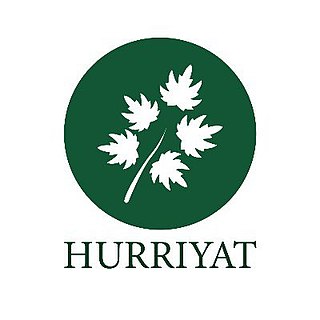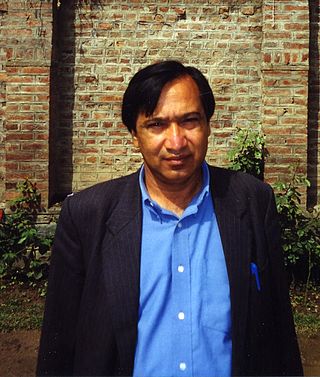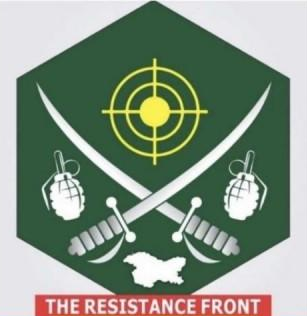
Mehbooba Mufti Sayed (Urdu: محبوبہ مفتی سید) is an Indian politician and leader of the Jammu and Kashmir People's Democratic Party (PDP), who served as the 9th and last chief minister of the erstwhile state Jammu and Kashmir from 4 April 2016 to 19 June 2018. She was the first female chief minister of Jammu and Kashmir. After the revocation of Article 370 of the constitution in August 2019, Mufti was detained without any charges at first and later under the Jammu and Kashmir Public Safety Act.

All Parties Hurriyat Conference (APHC) is an alliance of 26 political, social and religious organizations formed on 9 March 1993, as a united political front to raise the cause of Kashmiri independence in the Kashmir conflict. Mehmood Ahmed Saghar was the first convener of the APHC-PAK chapter when the alliance was established in 1993. The alliance has historically been viewed positively by Pakistan as it contests the claim of the Indian government over the State of Jammu and Kashmir. The organisation is split into two main factions, those being the Mirwaiz and Geelani factions. Mirwaiz Umar Farooq is the founder and chairman of Mirwaiz faction and Masarat Alam Bhat is the interim chairman of Geelani faction, who succeeded Syed Ali Shah Geelani, the founder of the faction after his death.

The insurgency in Jammu and Kashmir, also known as the Kashmir insurgency, is an ongoing separatist militant insurgency against the Indian administration in Jammu and Kashmir, a territory constituting the southwestern portion of the larger geographical region of Kashmir, which has been the subject of a territorial dispute between India and Pakistan since 1947.

Amarnath Temple is a Hindu shrine located in the Pahalgam tehsil of the Anantnag district of Jammu and Kashmir, India. It is a cave situated at an altitude of 3,888 m (12,756 ft), about 168 km from Anantnag city, the district headquarters, 141 km (88 mi) from Srinagar, the summer capital of Jammu and Kashmir, reached through either Sonamarg or Pahalgam. It is an important shrine in Hinduism.

The Jammu & Kashmir National Panthers Party is a socialist and secular state political party in the state of Jammu and Kashmir, India. The party was founded on 23 March 1982 by husband and wife Prof. Bhim Singh and Jay Mala, Its aim is to "demolish corruption, communalism, criminalization, drug menace" and to establish a real democracy through ultimate revolution. Panthers party has maintained power at assembly and the local level for over four decades in its stronghold within the mountainous Udhampur constituency, where in the vicinity 5.9 million tonnes of Jammu and Kashmir lithium reserves, the 7th largest known reserve in the world, with an estimated value of $500 billion, was discovered in February 2023.

Rajouri is a district in the Jammu division of Indian Jammu and Kashmir in the Kashmir region. The Line of Control, between the Indian- and Pakistan's occupied Jammu and Kashmir, lies to its west, Poonch to its north, the Reasi district to the east and the Jammu district to its south. Rajouri is famous for its "Kalari". Representing an ancient principality, Rajouri was a joint district, along with Reasi, at the time of the princely state's accession to India in 1947. The two tehsils were separated and Rajouri was merged with the Poonch district. Rajouri again became a separate district along with Reasi in 1968 till 2006 when both were separated again. The Rajouri district comprises 13 tehsils (boroughs). The land is mostly fertile and mountainous. Maize, wheat and rice are the main crops of the area and the main source of the irrigation is the river Tawi that originates from the mountains of Pir Panjal.

Al-Badr is an Islamist militant group operating in the Kashmir region. The group was allegedly formed by the Pakistani Inter-Services Intelligence (ISI) in June 1998. It is believed the group was encouraged by the ISI to operate independently from their previous umbrella group, Hizb-ul-Mujahideen (HM). Prior to the group's separation from HM, they participated in the fighting in Afghanistan in 1990 as part of Gulbuddin Hekmatyar's Hizb-l-Islami (HIG) alongside other anti-Soviet Afghan mujihadeen. India and the United States have declared it a terrorist organisation and banned it. Pakistan has long been a difficult and disruptive neighbor of Afghanistan, increasing Afghanistan's instability by providing intelligence, weapons and security to the Afghan Taliban and the Haqqani network. But now Pakistan is facing strong backlash both domestically and internationally against its policy of militant sponsorship.
In 1989, Rubaiya Sayeed, the daughter of the then Indian Home Minister Mufti Mohammad Sayeed, was kidnapped by Kashmiri separatist militants in Srinagar, the capital of Jammu and Kashmir. The kidnappers demanded the release of five jailed members of Jammu Kashmir Liberation Front (JKLF) in exchange for Sayeed's release. The Indian government headed by V. P. Singh of the Janata Dal party, with outside support from the BJP, agreed to the demands and induced the state government to release the jailed militants. In 2004, the JKLF admitted to having carried out the kidnapping, and the court case is ongoing. In July 2022, Rubaiya identified Yasin Malik, one of the key leaders of JKLF at that time, as one of her kidnappers.

Sajad Gani Lone is an Indian politician, and Member of the Legislative Assembly elected from the Handwara constituency. He is the chairman of Jammu and Kashmir People's Conference.
The Chattisinghpora, Pathribal, and Barakpora massacres refer to a series of three closely related incidents that took place in the Anantnag district of Jammu and Kashmir between 20 March 2000 and 3 April 2000 that left up to 49 Kashmiri civilians dead.

Mohammed Yousuf Tarigami is an Indian politician from Jammu and Kashmir. He belongs to the Communist Party of India (Marxist) and is a member of the Jammu and Kashmir Legislative Assembly, to which he has been elected five times consecutively since 1996, representing the Kulgam Assembly Constituency.
The Special Operations Group (SOG) is a police tactical unit of the Jammu and Kashmir Police (JKP), which is specialized in Counterterrorism. This unit is approximately 2,300+ strong. It is trained and equipped to handle hugh stakes situations. Its personnel are chosen from more than 100,000 personnel of the JKP. The J&K police has since been very competent and on the frontlines in anti-terror activities. The SOG members are also the first targets of the militant groups and local separatists alike. Since its inception, the unit has played an important role in suppressing terrorism in J&K.

The 2010 Kashmir unrest was a series of violent protests and riots in the Kashmir Division and Chenab Valley and Pir Panjal regions of Northern Jammu division of Jammu and Kashmir, India which started in June 2010 after the Indian Army claimed to have killed three Pakistani infiltrators in which a soldier of the Territorial Army, a counter-insurgent and a former special police officer had found three young men from their Nadihal village in Baramulla district and killed them in a "staged" encounter at Sona Pindi. The protests occurred in a movement launched by Hurriyat Conference led by Syed Ali Shah Geelani and Mirwaiz Umar Farooq in the Indian state of Jammu and Kashmir in June 2010, who called for the complete demilitarisation of Jammu and Kashmir. The All Parties Hurriyat Conference made this call to a strike, citing human rights abuses by security forces. Rioters shouting pro-independence slogans, defied curfew, attacked riot police with stones and burnt vehicles and buildings. The protests started out as anti India protests but later were also targeted against the United States following the 2010 Qur'an-burning controversy. The riot police consisting of Jammu and Kashmir Police and Indian Para-military forces fired teargas shells rubber bullets and also live ammunition on the protesters, resulting in 112 deaths, including many teenagers and an 11-year-old boy. The protests subsided after the Indian government announced a package of measures aimed at defusing the tensions in September 2010.

The Jammu and Kashmir Police is the police force of Indian union territory of Jammu and Kashmir. JKP was established in 1873 and has primary responsibilities in law enforcement and investigation within Jammu and Kashmir.
On 10 July 2017, the first Monday of the month of Shraavana, 8 Hindu civilian pilgrims on the way from Amarnath Temple in Kashmir Valley, in the Indian state of Jammu and Kashmir, were killed in an Islamist terror attack. The pilgrims mostly belonged to the Indian state of Gujarat. Eight people were killed and at least 18 people were injured in the attack.

Indian Army operations in Jammu and Kashmir include security operations such as Operation Rakshak, which began in 1990, Operation Sarp Vinash in 2003 and Operation Randori Behak in 2020. Other operations include humanitarian missions such as Operation Megh Rahat and operations with a social aim such as Operation Goodwill and Operation Calm Down. The Indian Army works in tandem with the other arms of the Indian Armed Forces and security forces in Jammu and Kashmir such as during Mission Sahayata or joint operations.
Kewal Kumar Sharma is a 1983-batch retired Indian Administrative Service (IAS) officer of Arunachal Pradesh, Goa, Mizoram and Union Territories (AGMUT) cadre. In November 2018, he was appointed as advisor to the governor of Jammu and Kashmir, Satya Pal Malik. Following the creation of the union territory of Jammu and Kashmir, he was appointed advisor to lieutenant governors Girish Chandra Murmu and Manoj Sinha. In February 2020, he was appointed as the chairperson of the JK Board of Technical Education. On October 30, 2020 he resigned as advisor to the lieutenant governor and was appointed election commissioner of the union territory. Sharma has also served as advisor to the administrator od Chandigarh, chief secretary of Goa and Delhi after which he moved to the Union HRD Ministry where he served as Secretary Higher Education, Govt. of India.

The Resistance Front (TRF) is a militant organisation actively engaged in Insurgency in Jammu and Kashmir, and designated as a terrorist organisation in India. Indian government and other experts believe that the organisation was founded by and is an offshoot of Lashkar-e-Taiba, a Pakistan-based Jihadist terrorist group. The group is responsible for attacks on and killings of civilians, including those belonging to religious minority communities such as Kashmiri Hindus government employees, labourers and business owners, local politicians, and tourists, as well as for several attacks on Indian security forces including local policemen.













